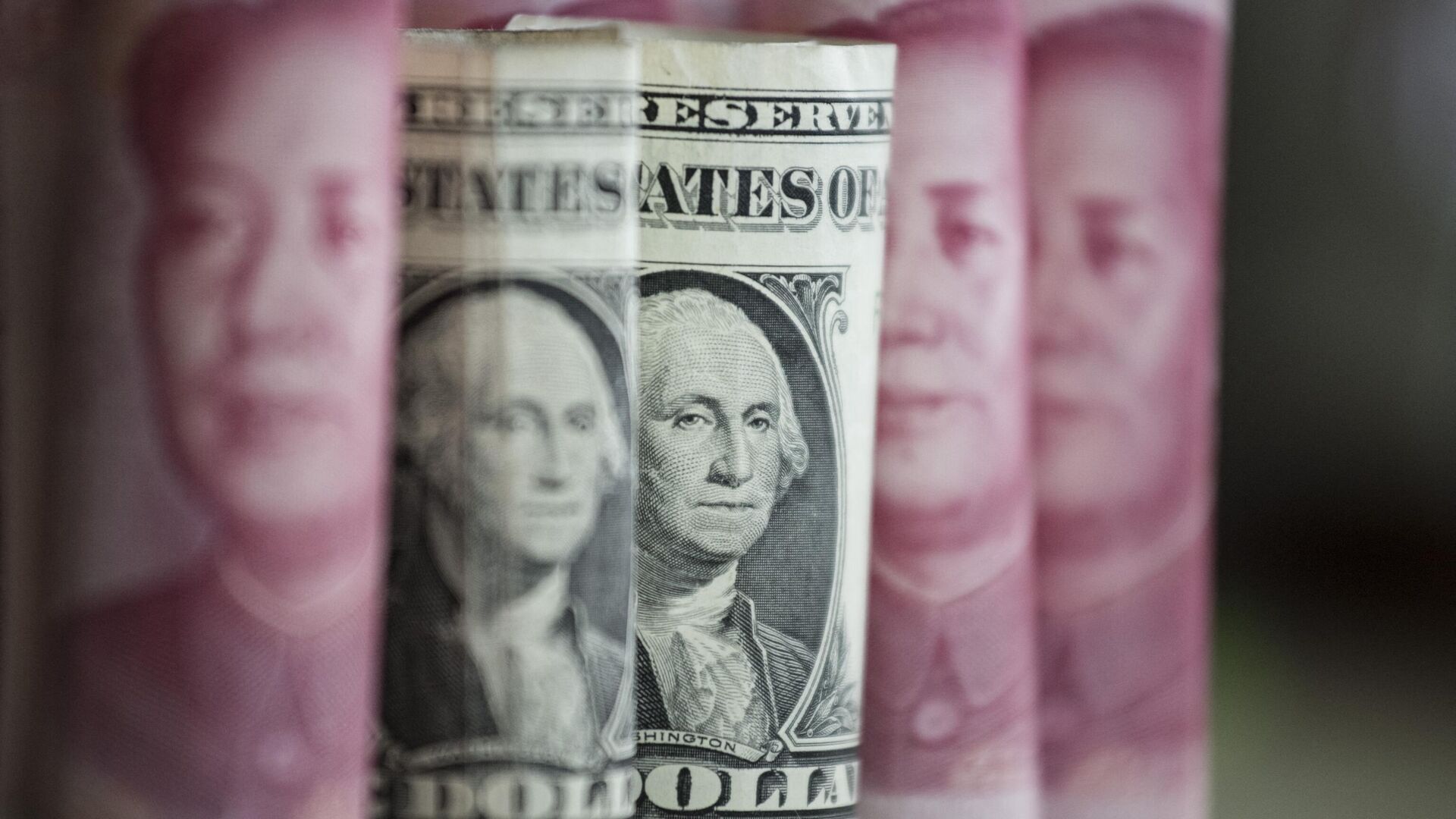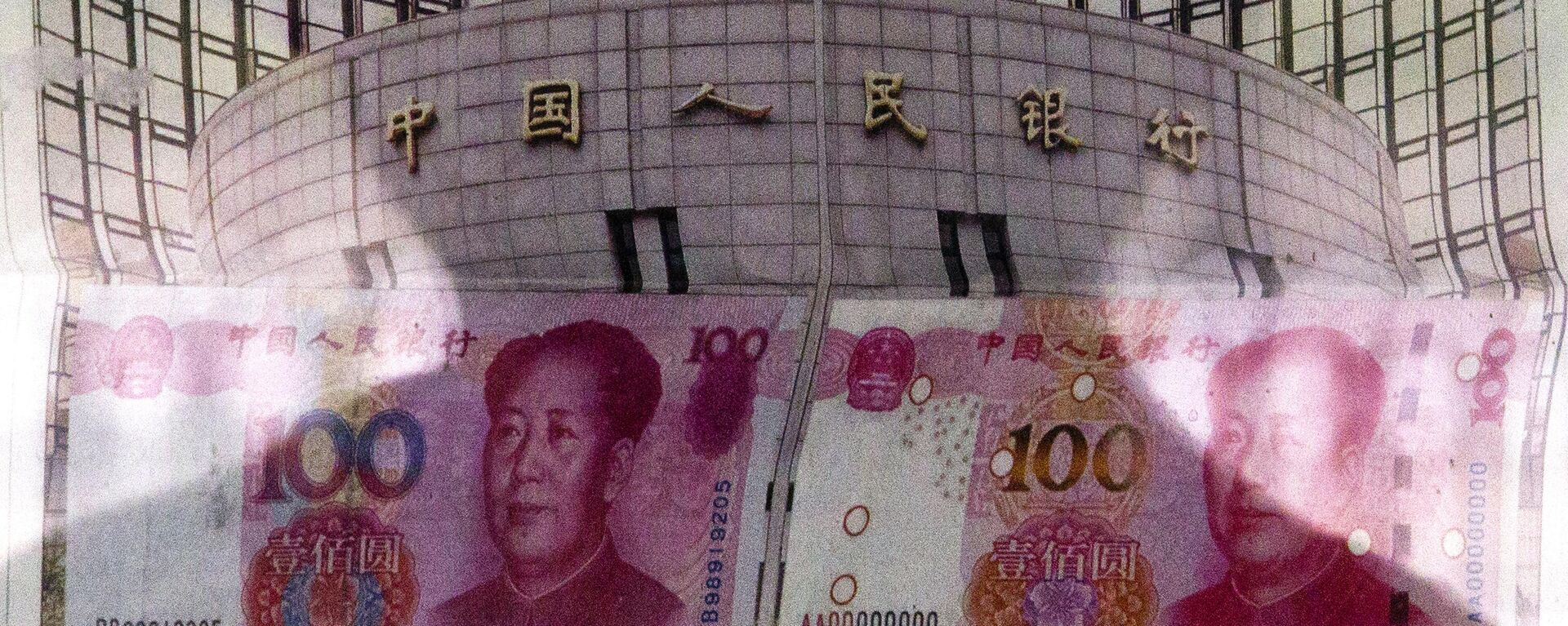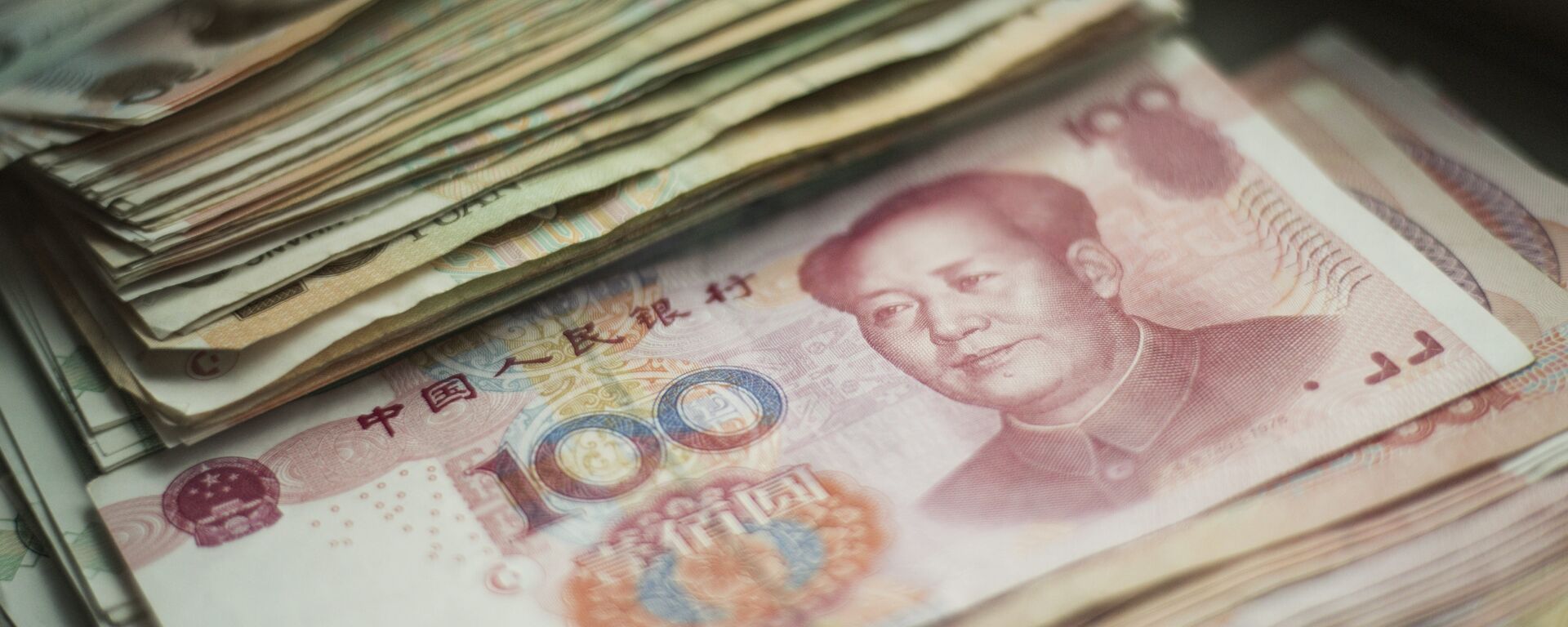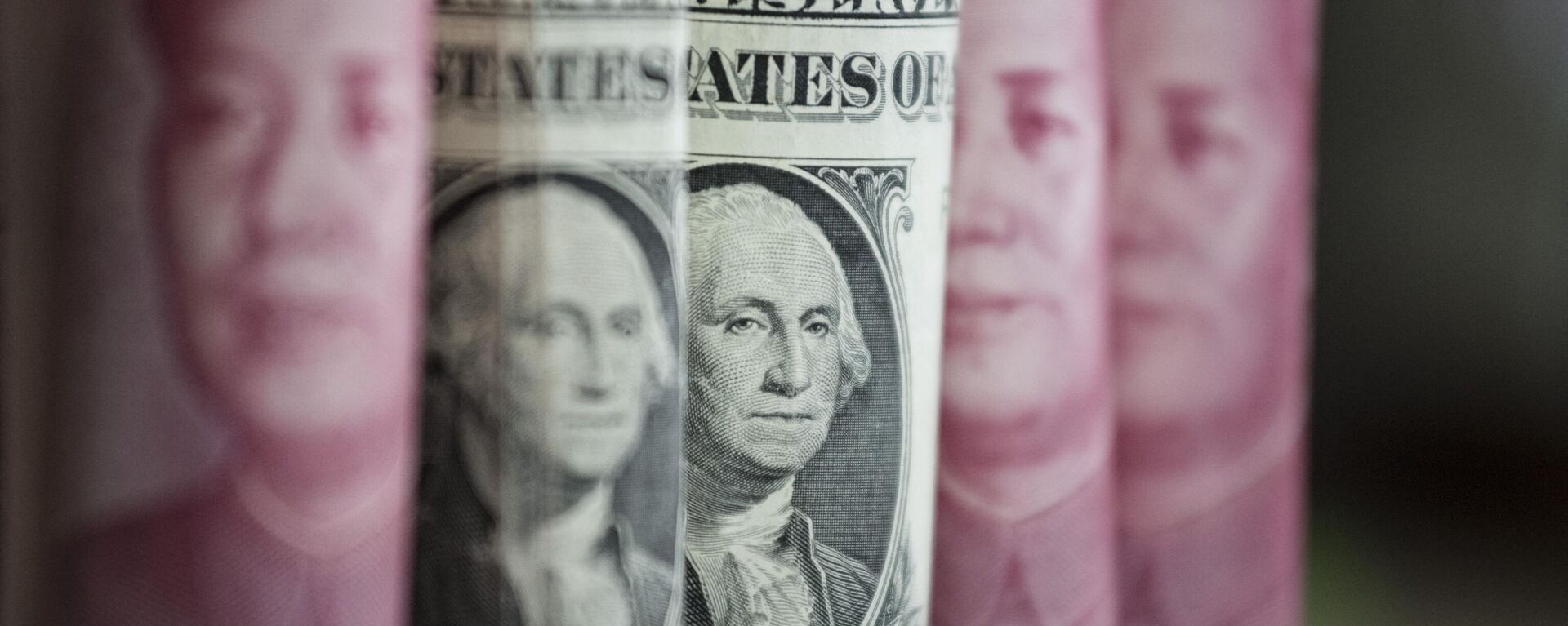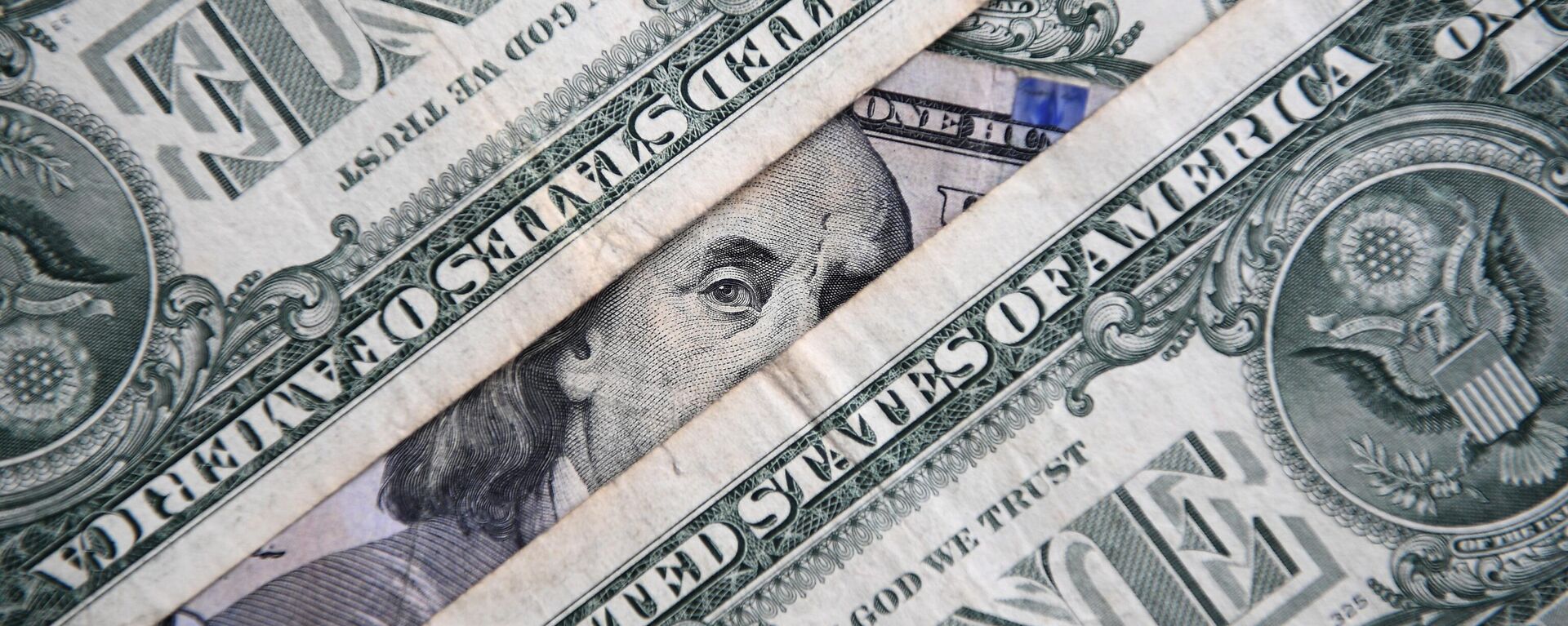https://sputnikglobe.com/20230427/toxicity-of-us-dollar-fuels-growing-sway-of-chinas-yuan-in-mercosur-trade-1109880129.html
'Toxicity' of US Dollar Fuels Growing Sway of China's Yuan in Mercosur Trade
'Toxicity' of US Dollar Fuels Growing Sway of China's Yuan in Mercosur Trade
Sputnik International
Argentina's shift to yuan in trade with China reflects growing trend driven by "toxicity" of the US dollar, analyst told Sputnik.
2023-04-27T17:23+0000
2023-04-27T17:23+0000
2023-04-27T17:23+0000
yuan
argentina
china
ditching dollar
dollar trade
alberto fernandez
brazil
https://cdn1.img.sputnikglobe.com/img/07e7/04/11/1109592439_0:161:3069:1887_1920x0_80_0_0_f50872b85bd55c7f38b80dec3ca75ade.jpg
Argentina's use of the yuan to pay for imports from China will undoubtedly further deepen bilateral relations, as it brings mutual benefits for both sides at a time when global confidence in the dollar and the euro has been waning, Wang Zhimin, director of China's Institute for Globalization and Modernization, told Sputnik. He touted the currency swap's ability to expand cooperation between Beijing and Buenos Aires.Argentina has abandoned use of the dollar and agreed with China to pay for its imports in yuan. The swap was carried out to “maintain reserves to secure imports of goods and resources that are key to the country," Argentine Economy Minister Sergio Tomas Massa underscored on April 26. In force for years, the currency swap deal between Argentina and China has been revised several times by the two countries. As announced by Sergio Massa, the deal with China will allow Argentina to pay for around $1 billion of Chinese imports in yuan instead of dollars in April, and, thereafter, for around $790 million worth of monthly imports from Beijing. 'Internationalization of Yuan'Weighing in on the announcement, Wang Zhimin underscored that China and Argentina have traditionally friendly relations, with a fresh package of documents on cooperation signed during last year's visit of Argentine President Alberto Fernández to China. Beijing has supported Argentina in its longstanding dispute with the UK regarding sovereignty over the Falkland Islands, also known as the Malvinas, while Buenos Aires, in turn, has reaffirmed its commitment to the "one China" principle. So the use of the yuan in trade settlements – an indicator of interstate ties – will serve to further enhance bilateral economic relations.Wang Zhimin said that the yuan has always enjoyed a relatively strong position on the financial market.Yuan as 'Intermediary Currency'After Brazil, Argentina has become the second country in the Southern Common Market, commonly known by the Spanish abbreviation Mercosur, to ditch the dollar in trade transactions with Beijing. As the sway of the yuan is further broadened, this trend is largely bolstered by the growing toxicity of the dollar, said independent economist Mikhail Belyaev.The economist explained that as the abovementioned countries are viewed by the United States as the “backyard” of US politics and economics, the current "toxicity" of the American currency "stimulates their withdrawal from the dollar zone.”The three countries of the MERCOSUR group, which boast 295 million people and have a combined GDP of nearly $2 trillion, are connected with China not by short-term interests, but by long-term economic and political prospects. Their switch to the yuan also fortifies the Chinese currency as a means of international payments. Russia is also set to use the currency in settlements with other world economies, affecting the US dollar's hegemony negatively. Furthermore, the role of the yuan as China's cross-border currency is also growing, as evidenced by March 2023 data, when the yuan overtook the dollar in such transactions for the first time. The yuan's share of China's cross-border payments soared to a record 48 percent at the end of March from almost zero in 2010. The share of the dollar fell to 47 percent from 83 percent.It is “technically possible and quite simple to create a supranational currency for two-four or more countries for settlements,” the expert said, and the yuan could potentially be a strong choice for “intermediary currency.”Weighing in on the idea put forward by Argentina and Brazil in January regarding the creation of a common currency for use in the region, Mikhail Belyaev said the difficulty lies in the “choice of the issuer of this currency, in balancing trade between all players, and the stability of the exchange rate of the supranational currency.”If Brazil and Argentina actively use the yuan in settlements with China, then it can also be used in transactions between themselves, Mikhail Belyaev underscored. The advantage of settlements in yuan is that it is already actively used in real trading operations. One need not fear for the stability of the yuan exchange rate, he said, and it would be easier to take the yuan as a ready-made settlement instrument than to create a supranational currency from scratch.'Global De-Dollarization Scenario'Argentina's snubbing of the US currency in trade with Beijing can be regarded as a gesture of autonomy from Washington in a global de-dollarization scenario, Francisco Cantamutto, economist and researcher at Argentina's National Scientific and Technical Research Council (Conicet), told Sputnik Mundo.Bearing in mind Argentina’s acute economic crisis caused by a shortage of foreign exchange and exacerbated by a dispute with the International Monetary Fund over debt repayment negotiations, "This will ease the position of the Argentine Central Bank,” he said.The agreement with China can be seen as a way to put pressure on the White House, Francisco Cantamutto added.Not only does the announced currency swap between Argentina and China reduce dependence on the US dollar, but it also forces the IMF to reconsider its position towards Argentina, Ismael Bermúdez, a journalist specializing in economics, said."This announcement is a relief because it suggests a move away from the dollar for trade," Bermúdez told Sputnik Mundo, adding that, "Washington is... forcing countries to look for partners with greater ability to adjust the terms of agreements, and this is where China comes in."
https://sputnikglobe.com/20230427/argentina-switches-to-payments-for-imports-from-china-in-yuan-1109869592.html
https://sputnikglobe.com/20230330/brazil-china-sign-agreement-to-trade-in-yuan-1108944998.html
https://sputnikglobe.com/20230417/inevitable-de-dollarization-which-countries-are-moving-away-from-greenback-1109592646.html
https://sputnikglobe.com/20230130/why-is-dollar-system-collapse-inevitable-amid-creation-of-brics-currency-1106818828.html
https://sputnikglobe.com/20230422/dollars-reserve-power-eroded-ten-times-the-pace-seen-in-two-decades-during-2022--report-1109762043.html
argentina
china
brazil
Sputnik International
feedback@sputniknews.com
+74956456601
MIA „Rossiya Segodnya“
2023
News
en_EN
Sputnik International
feedback@sputniknews.com
+74956456601
MIA „Rossiya Segodnya“
Sputnik International
feedback@sputniknews.com
+74956456601
MIA „Rossiya Segodnya“
argentina, shift to yuan in trade with china, shift to yuan instead of dollar, yuan swapped for dollar, de-dollarization, toxicity of the dollar, volatility of dollar exchange rate, internationalization of yuan, yuan as intermediary currency,
argentina, shift to yuan in trade with china, shift to yuan instead of dollar, yuan swapped for dollar, de-dollarization, toxicity of the dollar, volatility of dollar exchange rate, internationalization of yuan, yuan as intermediary currency,
'Toxicity' of US Dollar Fuels Growing Sway of China's Yuan in Mercosur Trade
Argentina's shift to the yuan instead of the US dollar in trade with China after Brazil also effected such a swap is part of a trend fueled by trust in the Chinese currency and a desire to step away from the volatility that the US dollar is infused with, the director of China's Institute for Globalization and Modernization said.
Argentina's
use of the yuan to pay for imports from China will undoubtedly further deepen bilateral relations, as it brings
mutual benefits for both sides at a time when
global confidence in the dollar and the euro has been waning, Wang Zhimin, director of China's Institute for Globalization and Modernization,
told Sputnik. He touted the currency swap's ability to expand cooperation between Beijing and Buenos Aires.
Argentina has abandoned use of the dollar and agreed with China to pay for its imports in yuan. The swap was carried out to “maintain reserves to secure imports of goods and resources that are key to the country," Argentine Economy Minister Sergio Tomas Massa underscored on April 26. In force for years, the currency swap deal between Argentina and China has been revised several times by the two countries. As announced by Sergio Massa, the deal with China will allow Argentina to pay for around $1 billion of Chinese imports in yuan instead of dollars in April, and, thereafter, for around $790 million worth of monthly imports from Beijing.
'Internationalization of Yuan'
Weighing in on the announcement, Wang Zhimin underscored that China and Argentina have traditionally friendly relations, with a fresh package of documents on cooperation signed during last year's visit of Argentine President Alberto Fernández to China. Beijing has supported Argentina in its longstanding dispute with the UK regarding sovereignty over the Falkland Islands, also known as the
Malvinas, while Buenos Aires, in turn, has reaffirmed its commitment to the
"one China" principle. So the use of the yuan in trade settlements – an indicator of interstate ties – will serve to further enhance bilateral economic relations.
Wang Zhimin said that the yuan has always enjoyed a relatively strong position on the financial market.
“Chinese currency is trusted. Even when the financial crisis hit Asia in 1997, China did not devalue the yuan, which became a bulwark of support for the region in overcoming the difficult economic situation. Currently, the economies of China and Argentina are largely complementary. With the expansion of bilateral economic cooperation, use of the yuan in settlements will help avoid risks from the volatility of the dollar exchange rate. At the same time, it will serve the purpose of further opening up China, and boosting the internationalization of the yuan," the director of China's Institute for Globalization and Modernization said.
Yuan as 'Intermediary Currency'
After Brazil, Argentina has become the second country in the Southern Common Market, commonly known by the Spanish abbreviation Mercosur, to ditch the dollar in trade transactions with Beijing. As the sway of the yuan is further broadened, this trend is largely bolstered by the growing toxicity of the dollar, said independent economist Mikhail Belyaev.
“Departure from the dollar in international trade has become a trend that is, apparently, irreversible. It has a solid economic foundation. Settlements in national currencies will deepen China's economic ties with Brazil and Argentina, and in the future, possibly with Uruguay - after the creation of a bilateral free trade area,” Mikhail Belyaev said.
The economist explained that as the abovementioned countries are viewed by the United States as the “backyard” of US politics and economics, the current "toxicity" of the American currency "stimulates their withdrawal from the dollar zone.”
The three countries of the MERCOSUR group, which boast 295 million people and have a combined GDP of nearly $2 trillion, are connected with China not by short-term interests, but by long-term economic and political prospects. Their switch to the yuan also fortifies the Chinese currency as a means of international payments. Russia is also set to use the currency in settlements with other world economies, affecting the US dollar's hegemony negatively. Furthermore, the role of the yuan as China's cross-border currency is also growing, as evidenced by March 2023 data, when the yuan overtook
the dollar in such transactions for the first time. The yuan's share of China's cross-border payments soared to a record 48 percent at the end of March from almost zero in 2010. The share of the dollar fell to 47 percent from 83 percent.
It is “technically possible and quite simple to create a supranational currency for two-four or more countries for settlements,” the expert said, and the yuan could potentially be a strong choice for “intermediary currency.”
Weighing in on the idea put forward by Argentina and Brazil in January regarding the creation of a common currency for use in the region, Mikhail Belyaev said the difficulty lies in the “choice of the issuer of this currency, in balancing trade between all players, and the stability of the exchange rate of the supranational currency.”
If Brazil and Argentina actively use the yuan in settlements with China, then it can also be used in transactions between themselves, Mikhail Belyaev underscored. The advantage of settlements in yuan is that it is already actively used in real trading operations. One need not fear for the stability of the yuan exchange rate, he said, and it would be easier to take the yuan as a ready-made settlement instrument than to create a supranational currency from scratch.
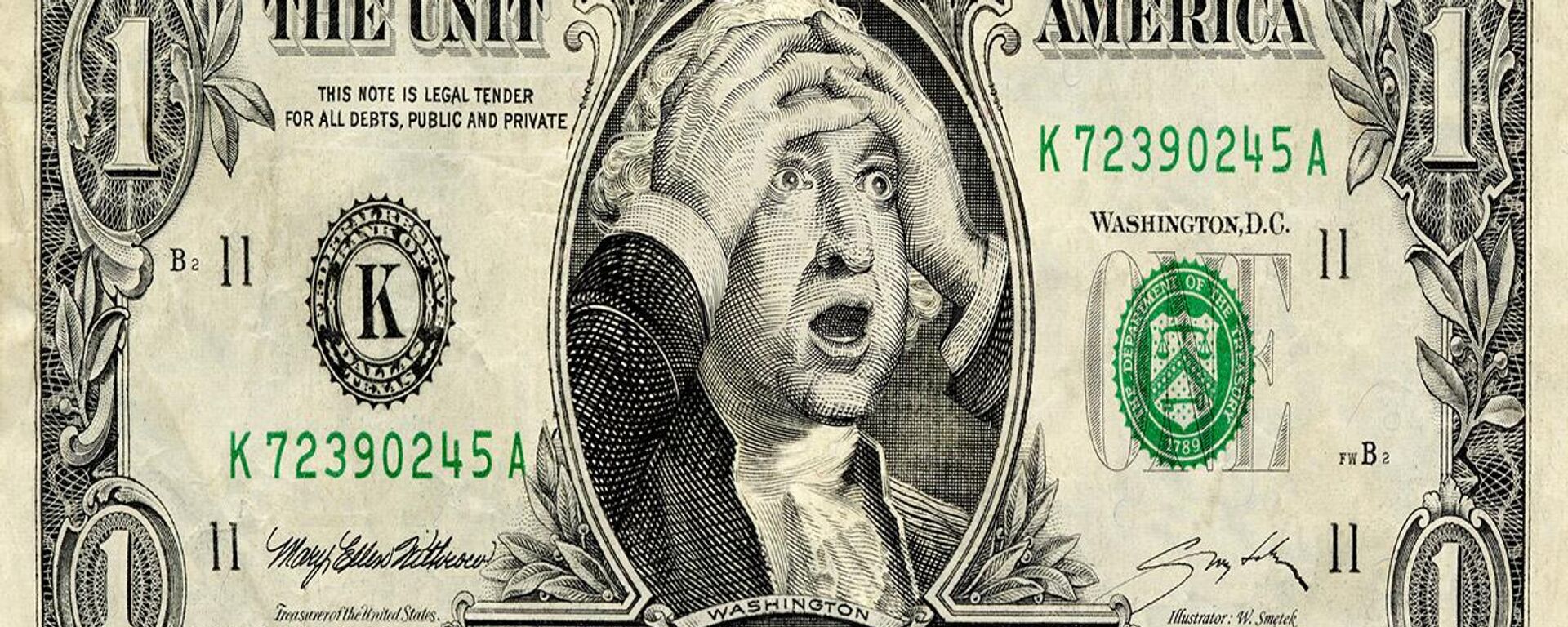
30 January 2023, 17:08 GMT
'Global De-Dollarization Scenario'
Argentina's snubbing of the US currency in trade with Beijing can be regarded as a gesture of autonomy from Washington in a global de-dollarization scenario, Francisco Cantamutto, economist and researcher at Argentina's National Scientific and Technical Research Council (Conicet),
told Sputnik Mundo.
Bearing in mind Argentina’s acute economic crisis caused by a shortage of foreign exchange and exacerbated by a dispute with the International Monetary Fund over debt repayment negotiations, "This will ease the position of the Argentine Central Bank,” he said.
The agreement with China can be seen as a way to put pressure on the White House, Francisco Cantamutto added.
“Argentina has been working to equalize relations with Washington, but now when it is necessary to renegotiate the agreement with the IMF, this puts pressure on them, showing that Buenos Aires is not in their pocket," Cantamutto stressed.
Not only does the announced currency swap between Argentina and China reduce dependence on the US dollar, but it also forces the IMF to reconsider its position towards Argentina, Ismael Bermúdez, a journalist specializing in economics, said.
"This announcement is a relief because it suggests a move away from the dollar for trade," Bermúdez told Sputnik Mundo, adding that, "Washington is... forcing countries to look for partners with greater ability to adjust the terms of agreements, and this is where China comes in."
“Increasingly, we are seeing the dollar break out of international triangulation... China has become a major investor in Latin America and the Caribbean, an area that the United States used to consider its privileged zone of influence,” Bermudez concluded.
